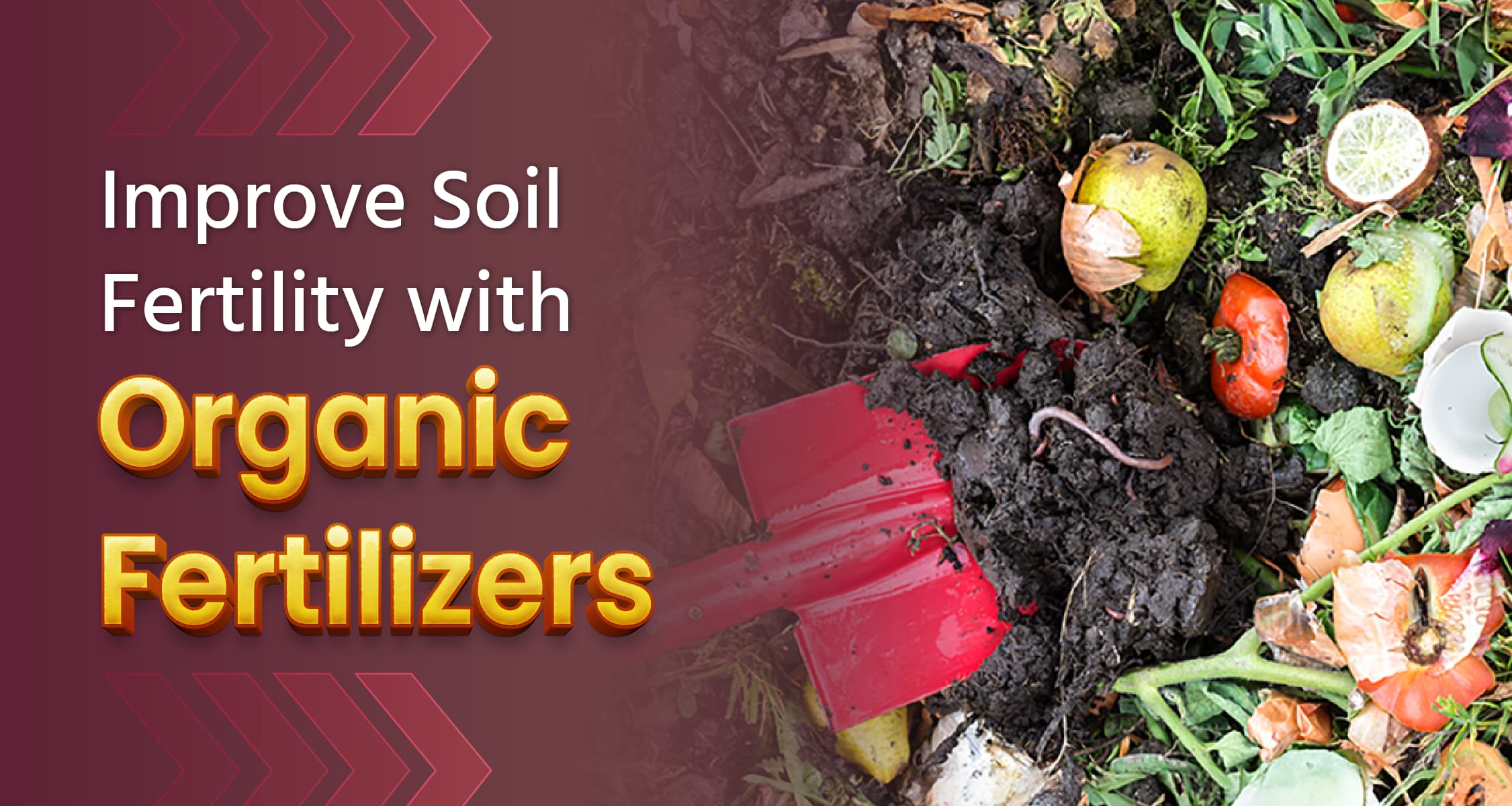Improve Soil Fertility with Organic Fertilizers

In modern agriculture, the use of chemical fertilizers has become widespread, but these chemicals also cause significant harm to the environment and human health. Chemical fertilizers are made from synthetic materials and provide immediate nutrition to plants. However, continuous long-term use of chemical fertilizers gradually decreases soil fertility. Moreover, their adverse effects on the environment are also considerable. In such a scenario, using organic fertilizers is a more viable option as they are natural substances used to improve soil fertility and plant growth. Since they are made from natural sources, they are eco-friendly. Let's go through detailed information about the use of organic fertilizers in crops through this post.
Importance of Organic Fertilizers in Agriculture
- Organic fertilizers are derived from natural sources and are environmentally friendly.
- They contain a wide range of nutrients essential for plant growth, including nitrogen, phosphorus, potassium, calcium, magnesium, and sulfur.
- Their use can enhance the microorganisms in the soil.
- Organic fertilizers help reduce the risk of chemical pollution that harms human health and the environment.
- They can be obtained/prepared from various sources such as animal manure, plant residues, and crop leftovers.
- Its use can considerably reduce chemical fertilizers usage leading to minimization of adverse effects on the environment and human health.
Difference Between Organic Fertilizer and Chemical Fertilizer
- Organic fertilizers are prepared from natural sources such as animal manure, bone meal, dried leaves, grass, crop residues, and fruit and vegetable peels. On the other hand, chemical fertilizers are made from synthetic materials.
- Organic fertilizers release nutrients slowly and steadily, providing plants with a long-term source of nutrition. In contrast, chemical fertilizers release nutrients quickly, providing plants with an immediate source of nutrition.
- Organic fertilizers improve soil health and structure, enhancing its ability to retain water and nutrients. Chemical fertilizers, however, can be harmful to soil health and structure as prolonged use can lead to soil acidification and nutrient depletion.
- Due to the absence of harmful chemicals, the use of organic fertilizers does not have any adverse effects on the environment. On the other hand, chemical fertilizers can be harmful to the environment, increasing the risk of water pollution, air pollution, and soil pollution.
- Organic fertilizers can be easily prepared at home using readily available materials, making them very cost-effective. In contrast, chemical fertilizers are relatively expensive.
Benefits of Using Organic Fertilizers in the Field
- Organic fertilizers improve soil health by increasing organic matter, enhancing soil structure, water retention capacity, and nutrient availability.
- They address nutrient deficiencies in crops.
- Continuous use of organic fertilizers gradually increases soil fertility, enabling farmers to achieve higher yields.
- Some organic fertilizers can be prepared at home at a very low cost, reducing the expenditure on agricultural inputs.
- They help improve crop quality by enhancing the taste, aroma, and nutritional value of the produce.
- The use of organic fertilizers reduces soil erosion while improving soil structure.
- Organic fertilizers enhance the soil's water retention capacity.
Main Sources of Organic Fertilizers
Some of the main sources of organic fertilizers are as follows:
- Animal Manure: Animal manure is a rich source of nutrients such as nitrogen, phosphorus, and potassium. It is obtained from animals like cows, buffaloes, poultry, fish, and others. For example, cow dung is an excellent organic fertilizer. It is commonly used as a fertilizer for crops.
- Compost: Compost is made from organic materials like food waste, dry leaves and wood, grass clippings, fruit and vegetable peels, etc. It is a nutrient-rich soil amendment that can be used to improve soil fertility.
- Green Manure: To obtain green manure, crops like alfalfa, legumes, rye, and maize are planted. These crops are plowed into the soil before reaching maturity. This helps increase organic matter and nutrient content in the soil.
- Fish Emulsion: Fish emulsion is made from fish waste and is a good source of nitrogen and other nutrients. It is commonly used as a liquid fertilizer for plants.
- Bone Meal: Bone meal is prepared from animal bones and is a good source of phosphorus and calcium. It is typically used as a fertilizer for flowering plants and vegetables.
Do you use organic fertilizers or chemical fertilizers in your crops? Share your answers and experiences with us in the comments. For more information like this, follow the 'Krishi Gyan' channel now. Also, like this post and share it with fellow farmers.
Frequently Asked Questions (FAQs)
Q: How do organic fertilizers increase soil fertility?
A: Organic fertilizers increase soil fertility by providing essential nutrients to the soil in a slow and steady manner. They improve soil structure, water retention capacity, and nutrient availability. Additionally, organic fertilizers promote the growth of beneficial microorganisms in the soil, which help break down organic matter.
Q: How can soil fertility be increased?
A: There are several ways to increase soil fertility, including the use of organic fertilizers, practicing crop rotation, growing cover crops, and mulching. It's also advisable to avoid the use of chemical fertilizers, pesticides, and herbicides. Moreover, try to minimize excessive tilling of the field as much as possible.
Q: What is the method for making bio-fertilizers?
A: The process of making bio-fertilizers varies depending on the type. Before preparing them, one should consider the type of soil and crops, and then select the appropriate materials and method accordingly.
Please login to continue

Get free advice from a crop doctor
